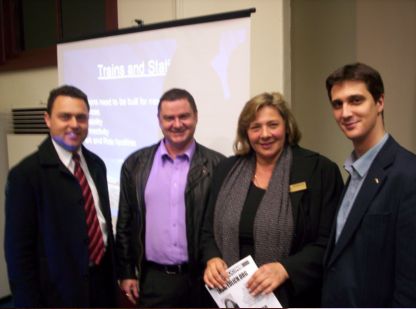This afternoon I was invited to deliver a presentation exploring the linkages between urban sustainability and public transport to the 41st Annual Geography Conference organised by the Geography Teachers Association of Victoria (GTAV).
The hour-long presentation provided a synopsis on the economic, social and environmental benefits of public transport, investigated current urban policies and examined Ringwood as a case study to demonstrate the interdependence between urban sustainability and public transport.
While the State Government appears to have neglected its goal of increasing public transport modal share to 20% by the year 2020, this target is required to mitigate rising congestion. With an annual cost of $4 billion annually, congestion is currently outpacing Melbourne’s population growth. Likewise the provision of public transport will provide transport choice to the many outer suburban households that are struggling due to rising petrol prices and the fact that private transport consumes up to 20% of budgets within these households.
The lack of public transport in Melbourne’s outer suburbs can also place non-car households at a significant disadvantage and limit the ability to participate in employment, educational, community and recreational opportunities. Similarly, obesity and health issues such as diabetes, can be symptomatic of car dependent suburbs where the potential to exercise is diminished.
In regard to environmental sustainability, transport accounts for 17% of Australia’s national greenhouse emissions and is the fastest growing sector of emissions. The figures are even more stark for individual households, where due to car dependence, transport is responsible for up to 49% of greenhouse emissions and is the largest contributing source of emissions within households.
These and other costs mean that car dependence is not sustainable and that urban sustainability cannot be achieved under current practices. While it may be claimed that excessive car usage contributes to the economy, when equating the economic, social and environmental impacts of car dependence there is an annual deficit of $16.3 billion.
Melbourne 2030, the State Government’s urban planning strategy was supposed to achieve a more sustainable future for Melbourne. While the plan identified numerous activity centres, each of which are earmarked for urban development, the public transport network that was supposed to cater to these urban centres remains underdeveloped.
This is even more apparent in the purpose-built activity centres that were initially designed to showcase the integration that was to result between transport and planning. Activity centres such as South Morang, Cranbourne East and Wyndham Vale have been denied much needed rail extensions despite their location within the rapidly developing growth corridors.
The problems experienced with Melbourne’s public transport system, such as unreliable train services, infrequent and poorly connected bus services and trams that terminate short of logical destinations can be resolved, but it requires Government will. Within Australia, Perth has proven to be an example of the improvements that can result from an integration between transport and planning and a commitment to urban sustainability. As an example, Perth recently doubled the size of its rail network, including the construction of a new 70km rail line (twice the distance of the CBD to Dandenong) and new stations are built simultaneously with urban development.
The integration that has borne results in Perth needs to be implemented in Melbourne, particularly for designated transit cities such as Ringwood. The suburb of Ringwood, located 27km east of Melbourne’s CBD, has been designated an area of higher density development but the State Government has been lacklustre in its commitment to improving public transport.
Ringwood currently suffers due to a disjointed retail precinct and transport hub which requires pedestrians to cross a six lane highway. Despite the goals of creating a sustainable community, the State Government and VicRoads have currently refused requests to make it easier to cross Maroondah Highway. Coupled with poor public transport, which includes making public transport users wait up to half an hour to travel between Ringwood and Croydon, the current culture of car dependence is exacerbated and potentially jeopardises the ability to create green open space and a new heart for Ringwood. Furthermore the lack of commitment over the redevelopment of Ringwood Station has created uncertainty for major developers resulting in unnecessary delays.
Each of these issues are interrelated, since due to poor public transport there is less open space which creates a pedestrian hostile environment and investment delays as developers wait for these issues to be rectified. While 40% of land in Melbourne used for roads and carparks, a staggering 62% of land within Ringwood is used for these purposes, leaving less land available for residential, commercial and community purposes.
While new developments, such as three storey residential buildings, are occurring the investment in public transport and hence the investor confidence in larger commercial developments is not. In particular, while residents within these new developments are encouraged to use public transport, walking and cycling as a form of travel this will not be sustainable if public transport is not improved.
Poor public transport connectivity and a lack of frequent bus services along main roads, such as Maroondah Highway, Canterbury and Wonga Roads, means that public transport usage will remain limited due to the fact that these poor levels of service fail to provide a real transport choice. The State Government must deliver significant public transport improvements to demonstrate that it is committed to creating a sustainable community within Ringwood.
The provision of sustainable transport is a key component of creating a sustainable community and increasing economic, social and environmental pressures means that action is required.
